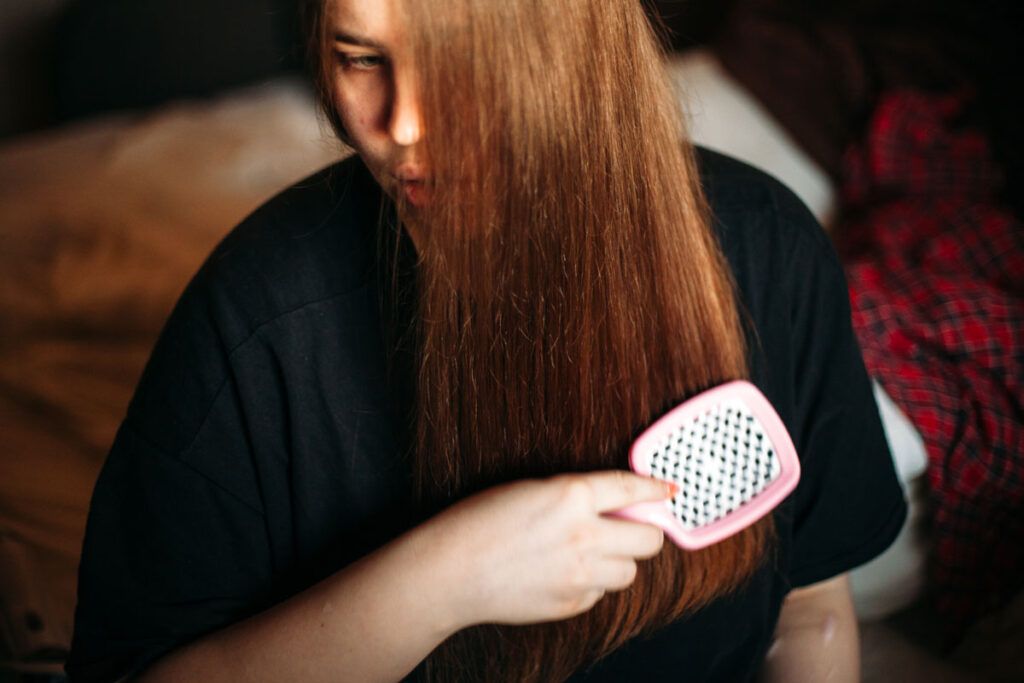Depression, or major depressive disorder, is a common mental health condition that causes emotional distress, such as feelings of sadness, hopelessness, and numbness. These symptoms can become severe, affecting your ability to complete daily tasks and even stop you enjoying your hobbies or social life.
Depression may also lead to physical symptoms, including hair loss.
Hair loss can be unpleasant and may appear as thinning hair, bald patches, or a receding hairline. Experiencing this may cause psychological symptoms and can develop as a result of health conditions, emotional distress, or traumatic events.
Hair loss and depression can often occur at the same time, and research suggests that they may cause each other.
Depression and hair loss: What’s the link?

Depression, or major depressive disorder, is a common yet serious mental health condition. According to the World Health Organization (WHO), it affects around 5% of adults globally.
Recent research from 2019 assessed over 6 million individuals with diagnoses of depression and alopecia areata.
Alopecia is a health condition where your immune system attacks your hair follicles, causing hair loss.
This research explores the link between alopecia and depression and suggests that if you have a diagnosis of major depressive disorder, you are 90% more likely to experience hair loss.
What’s more, they noticed that this link goes both ways and if you have hair loss, you are 34% more likely to develop a major depressive disorder.
This shows the potential for experiencing hair loss to have a significant effect on your mental well-being and that depression may affect your chance of developing alopecia.
Researchers are still uncertain about the exact reasons for these links. However, the emotional strain and stress that both hair loss and depression can cause are likely to play a role in the connection.
Factors influencing depression and hair loss
Depression causes a range of symptoms, and everyone experiences them differently. You may experience many different symptoms or just a few.
You may experience symptoms of depression that cause physiological changes that may contribute to hair loss. Certain treatments for depression may also have side effects that include hair loss.
Stress and hormonal changes
Symptoms of depression can vary greatly among individuals. Some symptoms that you may notice include:
- irritability
- restlessness
- feeling on edge
- impulsivity
- isolation
These stressful symptoms can present as physiological effects. These may appear as the following:
- headaches
- racing heart
- tightening in your chest
- digestion problems
Feelings of stress may lead to an increased chance of developing depression, as well as sometimes presenting as a symptom of the condition.
Long-term stress, as well as the digestive problems and trouble sleeping that stress often leads to, can put you at risk of many health problems. One of which is hair loss, or telogen effluvium.
While scientists do not yet fully understand the causes of the link between stress and hair loss, recent research on the hair growth cycles of mice may help us understand. Your hair grows in three main phases:
- growth phase (anagen)
- degeneration, where your hair stops growing (catagen)
- rest, where your hair sheds to make room for more growth (telogen)
During periods of stress, your body releases cortisol. This is a hormone that the adrenal glands produce. The researchers found that higher concentrations of the stress hormone cause hair follicles to remain dormant in the resting (telogen) phase.
This means that the hair is shedding without being replaced. Hair loss can be distressing, which may cause further depressive symptoms.
Antidepressant medications
Some case reports suggest that certain antidepressant medications may also contribute to hair loss.
For example, some 2021 research noted that one patient taking escitalopram (Lexapro) noticed hair loss symptoms. Even though the drug helped their depression, the hair loss made them wish to stop taking the medication. After switching to vortioxetine (Trintellix), the hair loss improved.
And one 2017 review notes two case studies of patients noticing hair loss after taking sertraline (Zoloft). While it comments that hair loss is more likely to be an uncommon side effect of selective serotonin reuptake inhibitors (SSRIs), it recommends people taking this medication are aware of the possibility.
However, research into the link between depression and hair loss found that antidepressant use lessened the risk of experiencing hair loss in people with alopecia. This is likely because relieving the stress that comes with depression may lower the chance of stress-induced hair loss.
If you need help covering the cost of medications, the free Optum Perks Discount Card could help you save up to 80% on prescription drugs. Follow the links on drug names for savings on that medication, or search for a specific drug here.
